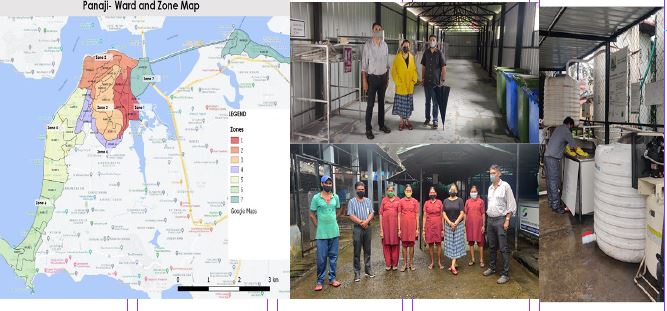By Nibedita Sen
REVOLUTIONARY waste segregation models in Goa set a new standard for India’s Solid Waste Management
India’s waste management crisis has found a beacon of hope in the innovative models implemented in Panaji and Goa.
Panaji’s revolutionary waste segregation model, which involves segregating waste into 16 categories, has been hailed as one of the most detailed segregation systems in the country. Similarly, Goa’s pioneering approach to waste management has improved waste segregation and disposal, while empowering women to take center stage in managing waste.
The Panaji model, implemented in partnership with NGOs and private companies, aims to reduce waste sent to landfills by 90% and promote recycling. The initiative has received an overwhelmingly positive response from residents, who appreciate its simplicity and effectiveness. The active involvement of the community has been instrumental in the initiative’s success, with residents taking ownership of the segregation process.
Goa’s waste management model, on the other hand, features a robust segregation system that has been made mandatory since 2016. The Goa Waste Management Corporation (GWMC) has established 45 manned waste transfer stations across the state to collect, segregate, and store waste before scientific disposal. The state has also set up a Material Recovery Facility (MRF) at GIDC, enhancing its ability to recover recyclables and reduce waste sent to landfills.
Both models in Panaji and Saligao have the potential to be replicated across India, offering a solution to the country’s burgeoning waste management crisis. With their emphasis on community involvement, segregation, and scientific disposal, Panaji and Goa are leading the way in waste management. The initiatives have already drawn attention from international organizations, with the United Nations Development Programme (UNDP) India praising the models as “best practices” in solid waste management.
In a significant boost to Goa’s waste management infrastructure, WWF-India and Saahas Zero Waste have jointly set up a Material Recovery Facility (MRF) at GIDC. The facility enhances the state’s ability to recover recyclables and reduce waste sent to landfills.
A solid waste treatment plant with a capacity of 100 tonnes per day was inaugurated at Saligao in 2016, using a mechanical biological treatment (MBt) process with proper segregation, recovery of recyclables, and bio-methanation process.
What sets Goa’s model apart is the active involvement of women in waste management. A woman-led waste management initiative has been recognized as a success story, showcasing the potential for community involvement in waste management.
Goa’s pioneering model has the potential to be replicated across India, offering a solution to the country’s burgeoning waste management crisis. With its emphasis on segregation, community involvement, and scientific disposal, Goa is leading the way in waste management.
As India continues to grapple with its waste management challenges, the success of Panaji and Goa’s models offers a glimmer of hope. By adopting these innovative approaches, other cities can reduce waste sent to landfills, increase recycling rates, and mitigate environmental and health impacts. The active involvement of women in waste management has also showcased the potential for community involvement in waste management, setting a new standard for India’s solid waste management practices.
(Nibedita is Jill of all trades and master of none though often better than master of one!)
https://www.altnews.in/author/nibedita/
